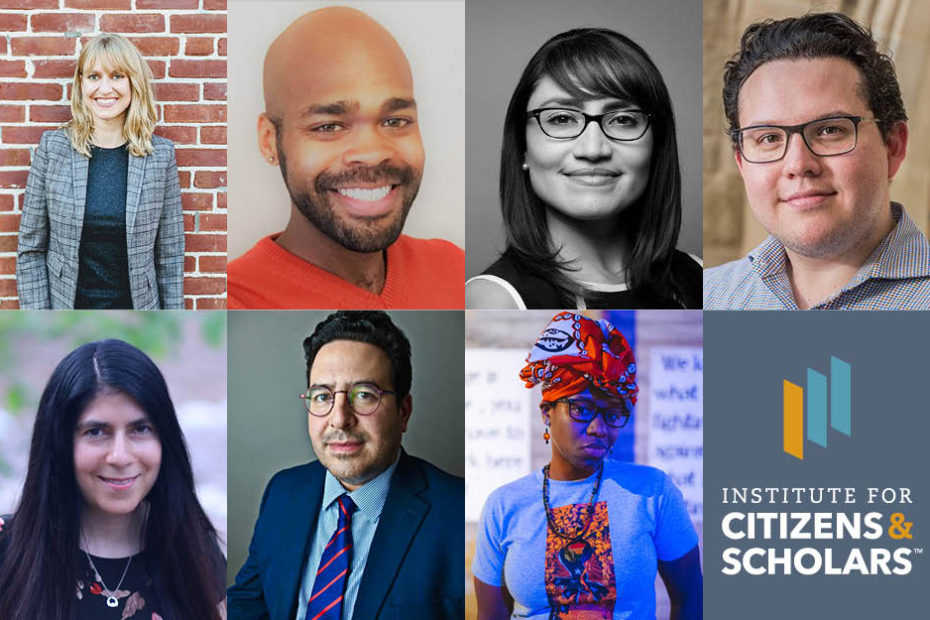2021 Mellon Emerging Faculty Leaders Named
Support For Excellent, Early-Career Professors Committed To Campus Service, Inclusivity
Share

NEWS RELEASE
FOR RELEASE: April 27, 2021
CONTACT: Frances Hannan | Director of Multimedia Projects
PRINCETON, NJ (April 27, 2021)—The Institute for Citizens & Scholars has named 11 scholars as 2021 Mellon Emerging Faculty Leaders (MEFL). Funded by The Andrew W. Mellon Foundation, the MEFL Awards support junior faculty whose research focuses on contemporary American history, politics, culture, and society, and who are committed to the creation of an inclusive campus community for underrepresented students and scholars.
The exceptional early-career professors making up this year’s class work in such fields as history, sociology, communications, and women’s and gender studies. Awardees’ scholarship focuses on critical issues such as human trafficking, violence in policing, and the impact of racial and ethnic disparities on cognitive function in older adults. They also work to mentor first-generation college students and those from underrepresented groups, and to ensure inclusion on campus and within their communities through service to their institutions and disciplines and through partnerships with local organizations. (See the full list of Fellows, their institutions, and research interests below.)
The MEFL Award seeks to free the time of junior faculty working toward tenure—including those from underrepresented groups and others committed to eradicating disparities in their fields—so that they can both engage in and build support for systems, networks, and affinity groups that make their fields and campuses more inclusive. Each recipient receives a 12-month stipend of $17,500 while working toward tenure.
The 2021 class comes from a diverse and competitive applicant pool. The final MEFL awardees were selected through a competitive interview process by a selection committee of four former and current university leaders with various academic and research backgrounds.
Established in 2015, the program has now supported more than 50 junior faculty who represent the next generation of leaders and scholars in the humanities and social sciences and who are poised to play a significant role in shaping American higher education. Through their own work to make their fields and institutions more inclusive, they are expanding civic discourse and preparing tomorrow’s citizens and scholars.
For more information on the Mellon Emerging Faculty Leaders Awards program, visit https://woodrow.org/fellowships/facultyleaders/.
###
About the Institute for Citizens & Scholars
The Institute for Citizens & Scholars (citizensandscholars.org) is a 75-year-old organization that has played a significant role in shaping higher education. Now, with an expanded mission Citizens & Scholars prepares leaders and engages networks of people and organizations to meet urgent education challenges. The overarching goal is to shape an informed, productively engaged, and hopeful citizenry.
2021 MELLON EMERGING FACULTY LEADERS
Mike Amezcua • Georgetown University, history
Making Mexican Chicago: From Postwar Settlement to the Age of Gentrification
Philis M. Barragán Goetz • Texas A&M University–San Antonio, history
The Borderlands of Inclusivity: Jovita González and the Mexican American Civil Rights Movement
Andrés Castro Samayoa • Boston College, educational leadership & higher education
Minority Serving Institutions: Administering Ethnoracial Identities and Education’s Common Good
Charity Clay • Xavier University of Louisiana, sociology and African American and diaspora studies
Le Triangle Noir: Lasting Impact of the French Colonial Empire on Port Cities of the African Diaspora
Amira Rose Davis • Pennsylvania State University, history
Can’t Eat a Medal: The Lives and Labors of Black Women Athletes in the Age of Jim Crow
Vivian L. Huang • Williams College, women’s, gender, and sexuality studies
Surface Relations: Queer Forms of Asian American Inscrutability
Gema Kloppe-Santamaria • Loyola University Chicago, history
In the Vortex of Violence: Lynching, Extralegal Justice and the State in Post-Revolutionary Mexico
Ana Muniz • University of California-Irvine criminology, law & society
Borderland Circuitry: Immigration Surveillance in the United States and Beyond
Allison Page • Old Dominion University, communication and theatre arts; Institute for the Humanities
The Affective Life of Slavery: Race, Media, and Governance
Kyler Sherman-Wilkins • Missouri State University, sociology
Social Determinants of Cognitive Functioning Among Diverse Older Adults in the United States
Elena Shih • Brown University, American studies
Manufacturing Freedom: Trafficking Rescue, Rehabilitation, and the Slave Free Good
Stay Engaged
Get More News
Join our mailing list to get more news like this to your mailbox.
Support Our Work
Help us invest in the talent, ideas, and networks that will develop young people as effective, lifelong citizens.
Ways to Support Us